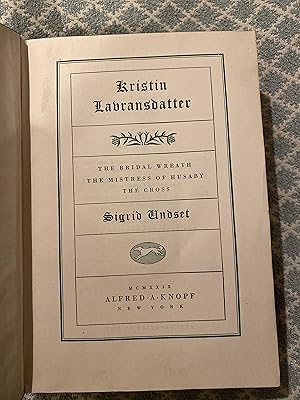
At 1100 pages long, nothing seemed wasted or overblown. It’s much more about sex and marriage and children and growing things than it is about war and politics, but those things do find their way in as well, because they affect everyone’s lives. It’s moving, true to life, tolerant and humanistic. Kristin Lavransdatter is a powerful trilogy. I don’t know about you, but that sounds awfully like me. She worried about her sons, did her work, and found only fleeting moments of clarity when she could understand her own motives. At one and the same time, I realized how different her life was from mine, living in an agrarian society that was only half-converted from its pagan ways, and how similar all human beings are at all times. Death, birth, murder, accusations of adultery, illegitimate children, and the coming of the black plague (which, according to Norwegian annals, killed two thirds of the Norwegian population) make Kristin’s humble life as a quiet housewife into one of fierce joy and suffering. This book is perhaps the most dramatic of the three. What comes of this separation, and of the time that passes, is the rest of Kristin’s story. After a time, the tensions in the marriage grow too great, and Erlend leaves the house for a small, one-man farm up the mountain. They’re not well-liked in their new valley, and Kristin’s resentments build toward Erlend, who doesn’t seem to understand what he’s done.

They have been exiled from their estate at Husaby because of Erlend’s ill-considered political actions, and now they are all suffering the consequences.

The Cross is a fitting conclusion to this immensely moving and powerful story.Īs the third volume begins, Kristin is living in her childhood home with her husband, Erlend, and her seven sons.

In this final volume of Sigrid Undset’s Nobel Prize-winning novel, Kristin Lavransdatter, all the theological implications of the cross find their way into the narrative in a sweetly mystical strain, along with threads from the earlier parts of the story, but without being heavy-handed. In Christian theology, the cross means pain, suffering, and death, but it also represents what comes beyond that, at the resurrection: grace, redemption, love, and life.


 0 kommentar(er)
0 kommentar(er)
